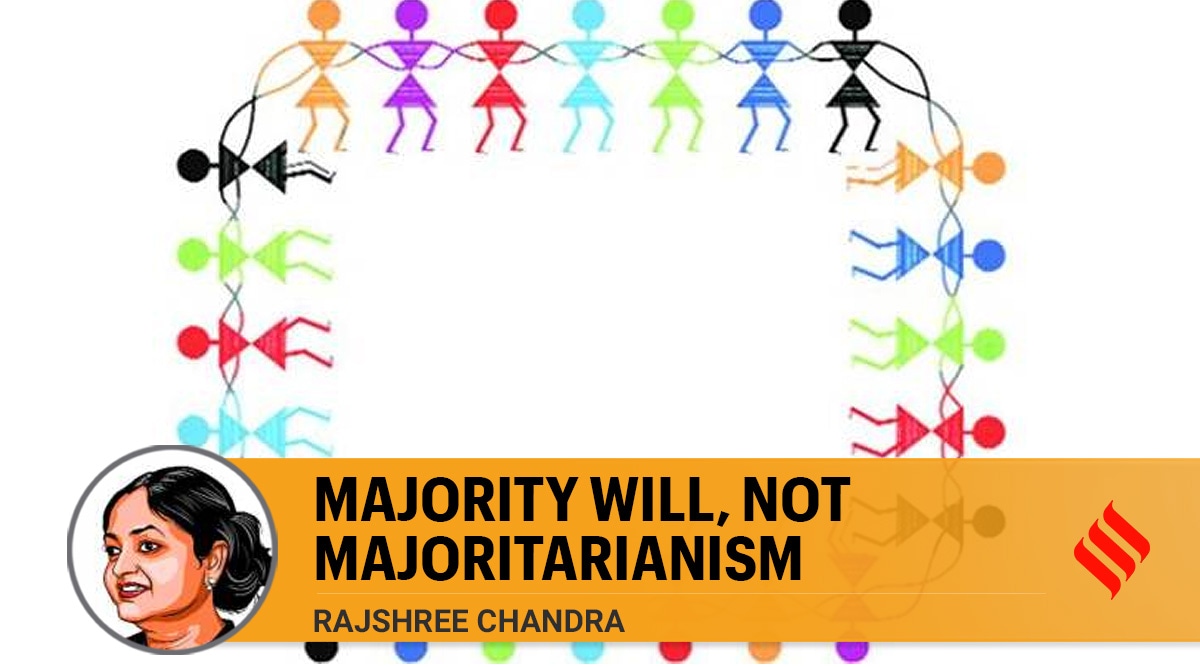J Sai Deepak is man-splaining and savarna-splaining. Majority will isn’t majoritarianism
To conflate the two very different concepts is mischievous and politically motivated

J Sai Deepak in a recent article (‘The “Majoritarianism” slur’, June 22) argues that “majoritarianism” is used to gaslight Hindus and makes a case for majoritarianism. Further, he proposes that since Bharat, historically and civilisationally, has always been Hindu, constitutional morality too should be located in this civilisational context. In other words, it is okay if court judgments abide by and uphold majoritarian interests, faith and morality. These unabashed Hindu-first arguments are not new, but given Sai Deepak’s intellectual standing, his article falls short on reasoning, substance and “good faith”.
First, JSD begins with a conceptual error. His definition of majoritarianism — “as that form of legitimate political authority which expresses the will of the majority” — conflates a principle with its perverted form. The bottom line of a democracy is that it represents the majority will. The majoritarian principle becomes the basis to form governments, make laws and policies. However, once laws/policies are made, the processes of implementation and the principles of justice are not (or should not), in any democratic set-up, subjected to majority will tests. If it did, we would not have had the judgment that decriminalised homosexuality, or the Sabarimala verdict that granted temple entry for women of menstruating age.
Majoritarianism like all “isms” is an ideological construct and not a benign representation of majority will as JSD seems to suggest. That the BJP is in power is reflective of the majority will. But one cannot assume that everyone who voted the BJP to office supports the lynchings of Muslim cow traders, or supports the CAA/NRC or demonetisation, or backs Brij Bhushan Sharan Singh, the Wrestling Federation of India chief accused of sexually harassing women wrestlers. An electoral majority is perhaps the only representation of “majority will” that can be asserted with a degree of certitude. Any further extrapolation is neither self-evident nor logically inferable.
This mistaken or deliberate conflation between majority will and majoritarianism becomes the basis for JSD’s second argument. According to him, to cry “majoritarianism” in a democracy without making out a case of unconstitutionality, is to question the majority principle which forms the very basis of a democracy. This is an unreasonable and strange expectation.
The conduct of majoritarianism does not abide by state-civil society boundaries. Its theatre may be outside of state and democratic institutions. It is out there on the street hounding a hapless cow trader, or in the burning of cinema halls, banning books and so on. Not every victim of majoritarian power or every dissenter is endowed with the capacity to prove the unconstitutionality of majoritarianism. Besides, in the absence of robust anti-discriminatory laws, expecting a “constitutional case” to be made out in each case is bizarre.
Majoritarianism is out there, visible in plain sight, which is why some (good) Hindus “cry majoritarianism” to assert their distance from the vulgarity that is being perpetuated in their name. It is to assert their will and affirm a Hindu identity that they choose to define themselves. There are thinking, humane Hindus who do not buy into the lies of “dwindling numerical majority”, or of “cession of cultural, political, constitutional, and ultimately physical spaces”.
JSD’s third point is that constitutional morality should serve the civilisational identity. He accuses the courts of parroting the political rhetoric of “Hindu majoritarianism”. He alleges that courts’ constitutional morality displays “greater elasticity when the subject of adjudication is human rights or minority rights but shrivels and shrinks with great alacrity when the civilisation itself looks to it for justice”. One wonders what JSD’s approval rating would be for the following court judgments — the SC dismissal of J&K delimitation; the Ayodhya verdict; the Hindutva judgment etc.
Do the above instances qualify as the courts’ morality being informed by civilisational ethos? The idea of a civilisational morality is so notoriously pliable and capacious that it begs such questions. I ask because the many un-named elephants in that room need a jurisprudential language. I also ask because I have no clue to where women and Dalits stand in JSD’s plan of civilisational morality. I ask because as one half of the population, we do not wish to be mansplained or savarna-splained about the virtues of our civilisational legacy.
We have come a long way, remaking and enriching our civilisation and freedoms with every passing day. Do not scare us with bogeys of “organised, monotheistic, iconoclastic, expansionist, and colonising worldviews”, or with visuals of Hinduism weathering “the bottomless and genocidal territorial hunger of two monochromatic worldviews”. We know fear and recognise it when we see it.
Years ago, Savarkar had called Hindus effeminate for not espousing warfare. JSD uses a similar language when he tells Hindus that they are made to “constantly and unequivocally express contrition”, to “atone for their sins” as they are made to cede their “cultural, political, constitutional, and ultimately physical spaces”. This is actually and quite literally, gaslighting. To explain, can we go back to a literal, straightforward meaning of gaslighting — which just means using gas to light fire.
The writer teaches political science at Janki Devi Memorial College, DU